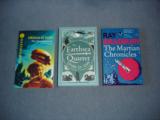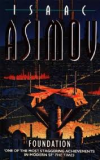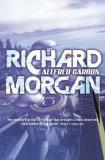-
Posts
7,149 -
Joined
-
Last visited
Content Type
Profiles
Forums
Events
Books
Everything posted by Karsa Orlong
-
What's Rachel Stevens doing curling for Canada?
-
I thought the Coen Brothers' version was very good. I still prefer the original, though
-
Just saw that the £9.50 set of the trilogy is back on Amazon Marketplace from the same seller I got mine from, if anyone's interested http://www.amazon.co.uk/Isaac-Asimov-Foundation-Trilogy-Empire/dp/B00DHJMVE4/ref=sr_1_8?s=books&ie=UTF8&qid=1392720907&sr=1-8&keywords=foundation+isaac+asimov
-
Feel better soon, Devi!
-
I doubt very much that I'll read the other books in the series, not in a hurry anyway. Everything I've read about them says they're quite inferior to this trilogy I expect I'll get The Complete Robot at some point, though Usually reading a whole trilogy in quick succession like this works badly for me, as my interest tends to wane, I get author burn-out etc. But I've got so many series on the go, plus more that I want to read, I think I'm going to have to do it more to get through and finish some of them. So I'm planning on going straight back to Richard Morgan after this, then some more Cornwell and Dresden, then I'm going to re-read Alastair Reynolds' Revelation Space and finally get on to reading the rest of the books in that series. That's the plan at the moment, anyway!
-
It helps that they're short - the three of these books just about make up the length of the usual novels I read
-
Men's snowboard cross - exciting and hilarious - you can't beat that combination Nearly time for the short track 1,000m. Come on Elise!! ETA: Blimey, if only her heat had been the final
-
# 12 Foundation & Empire by Isaac Asimov 1952 - Harper Voyager paperback - 240 pages From Amazon: Thoughts: I won't give too much detail on this one, as it's a sequel and a couple of people have said they are going to read them at some point. Foundation & Empire contains two longer stories, as opposed to the five shorter ones in the first book. Beginning soon after the end of Foundation, these two stories span the next century. I think the novella length of each gives them a bit more room to breathe, and the stories benefit from this greatly. They are still fast-paced and full of big ideas, but the characters work better. I wouldn't call them brilliant - it's more about the ideas than the people - but they seemed to me to be more natural. Plus Asimov actually included a major female character who plays a vital role in the second story, so this mostly addressed the previous book's major failing, imo, although she still seems to spend some of her time in the kitchen making sandwiches There are some intriguing developments in the idea of Seldon's Foundation and psychohistory. Also, these stories see quite a lot more to the narrative than the talking heads of the first book. Although I wouldn't say there was action, as such, the inference is there, and there is much more in the way of descriptive storytelling. Overall, I've found these stories exciting, but in a more thoughtful way than I would have expected. These are tales where knowledge and intelligence win out over force and violence, and Asimov's writing is very clear, concise, and never confusing. At one stage, around halfway through, I was thinking it might be my first 10 of the year, but this was slightly knocked down by the fact that the big 'twist' in the second story is obvious from very early on (in fact, I couldn't believe the characters didn't figure it out sooner, it's so glaring). Fortunately there's another, far better twist in store, which I didn't see coming, but then the last five pages of the story are given over to a character explaining everything that had gone on before - a little unnecessary! Still, I thoroughly enjoyed this book, and would say it was superior to the first. I'm moving straight on to the final book of this original trilogy. 9/10
-
Thanks Devi
-
Ditto!
-
Love that film! By contrast, watched Oblivion on Friday. Tom Cruise saves the world. Again
-
Oh dear, fog's stopped play
-
Good luck with the interview and the house-buying, Tim
-
Thanks guys I managed to get the three paperbacks as a set through Amazon Marketplace for £9.50 - the cheaper option, rather than £75 for the Folio Society editions
-
Oh thanks, Sarah It's not today, though - I'm just a bit late in posting that pic
-
-
# 11 Foundation by Isaac Asimov 1951 - Harper Voyager paperback - 234 pages From Amazon: Foundation marks the first of a series of tales set so far in the future that Earth is all but forgotten by humans who live throughout the galaxy. Yet all is not well with the Galactic Empire. Its vast size is crippling to it. In particular, the administrative planet, honeycombed and tunneled with offices and staff, is vulnerable to attack or breakdown. The only person willing to confront this imminent catastrophe is Hari Seldon, a psychohistorian and mathematician. Seldon can scientifically predict the future, and it doesn't look pretty: a new Dark Age is scheduled to send humanity into barbarism in 500 years. He concocts a scheme to save the knowledge of the race in an Encyclopedia Galactica. But this project will take generations to complete, and who will take up the torch after him? The first Foundation trilogy (Foundation, Foundation and Empire, Second Foundation) won a Hugo Award in 1965 for "Best All-Time Series". It's science fiction on the grand scale; one of the classics of the field. Thoughts: Isaac Asimov’s Foundation is a series of interconnected short stories which were originally published in the 1940’s, and then gathered together into novel form in the early 1950s. Set many thousands of years in the future, they tell tales of a time when humanity has spread throughout the galaxy, so far and so long ago that they have forgotten Earth even exists. But the Galactic Empire is tumbling through its final years, and a man called Harry Seldon has developed a new science that claims to predict the future of large populations over vast periods of time. He calls it ‘psychohistory’ and he has predicted the fall of the Empire, and a subsequent 30,000 years of barbarism, unless he and his Encyclopaedia Foundation can complete their task of preserving all of mankind’s history and knowledge. Using psychohistory, Seldon correctly predicts, manipulates, and accommodates the fact that he and his Foundation will be banished to the edge of the galaxy, and the uninhabited planet of Terminus, where they will begin their task. The five short stories included in this first volume cover a period of roughly two centuries, with each story being told from the point of view of a major figure in the Foundation’s story, and the so-called ‘Seldon Crises’ that they face, and which he has predicted. It’s a kicking-off point for Asimov to explore various themes from politics to religion to economics – and if that sounds a little boring, well, it isn’t, and that, I think, is down to the amazing clarity of the writing. Asimov made complex ideas so easy to follow that the book, for the most part, is a joy to read – a huge amount of fun (there’s an underlying wit to the writing that is enjoyably subtle), very thought-provoking, and somehow quite thrilling, even though there is not a single action scene during the whole book. In fact, each short story amounts to little more than various characters having various conversations, but it is through their dialogue that the stories evolve, and it’s so well done that I was swept along by it. Of course, being written the best part of 70 years ago, there is some fallout from the attitudes of the time: all of the men smoke like chimneys and drink like fish; they talk formally; they sport moustaches and play political tennis in virtually every conversation. This is all easy to overlook, even if it is unintentionally amusing these days, and gives the narrative a slightly stiff-upper-lip feel. But the one aspect it is difficult to overlook is that there is only one female character in the entire book, and she only has two minor scenes. It’s almost as if the thought of women in important and/or powerful positions was something Asimov thought the future couldn’t possibly contain. It’s somehow anachronistic, reading it now, as if his vast imagination and foresight couldn’t comprehend this most important aspect. Get back in the kitchen, basically. It’s summed up in one particular paragraph, when one (male) character describes how he is going to control a particular piece of technology: “The small household appliances go first. After half a year of this stalemate that you abhor, a woman’s atomic knife won’t work anymore. Her stove begins failing. Her washer doesn’t do a good job. The temperature-humidity control in her house dies on a hot summer day.” This annoyance aside, it’s easy to see how influential this book has been (George Lucas even nicked the capital city planet of Trantor for Coruscant in the Star Wars movies). It’s almost as if it created its own genre, the ‘socio-political’ SF novel, moving away from more pulpy aspects (the sci-fi, if you like ) and trying to do something altogether more thought-provoking. I thought it was, by and large, excellent. 8/10
-
Thanks guys I think, even though it's classed as a trilogy, it's just the character that carries over from book to book, but otherwise they're standalone, so you could probably get away with reading the last one first I'll let you know in a few weeks
-
I've managed to miss most of the women's snowboard cross this morning Just switched on in time to see Lindsey Jacobellis fall over again
-
Go Lizzy!!! Brilliant stuff! As Kay said, she made that last run a bit too nervy for my liking Feel so sorry for Elise Christie. I mean, she was at fault in both races, but to be targeted for cyber-bullying as a result? There are some deeply stupid people around Hope she sticks it to them in the 1000m.
-
I watched that, too - it was great fun. Watching the ice hockey now
-
# 10 Altered Carbon by Richard Morgan 2002 - Gollancz ebook - 546 pages From Amazon: In the twenty-fifth century, humankind has spread throughout the galaxy, monitored by the watchful eye of the U.N. While divisions in race, religion, and class still exist, advances in technology have redefined life itself. Now, assuming one can afford the expensive procedure, a person’s consciousness can be stored in a cortical stack at the base of the brain and easily downloaded into a new body (or “sleeve”) making death nothing more than a minor blip on a screen. Ex-U.N. envoy Takeshi Kovacs has been killed before, but his last death was particularly painful. Dispatched one hundred eighty light-years from home, re-sleeved into a body in Bay City (formerly San Francisco, now with a rusted, dilapidated Golden Gate Bridge), Kovacs is thrown into the dark heart of a shady, far-reaching conspiracy that is vicious even by the standards of a society that treats “existence” as something that can be bought and sold. For Kovacs, the shell that blew a hole in his chest was only the beginning. . . . Thoughts: This book was on my wishlist for a long, long time. I’d seen much praise for Richard Morgan on other forums, both for his currently ongoing fantasy series (A Land Fit for Heroes) and his earlier science fiction novels, of which Altered Carbon is the first of a trilogy about a character called Takeshi Kovacs. Kovacs is an Envoy, essentially a futuristic member of the special forces. The story begins explosively as he and his partner, Sarah, are hunted down by the militia of Millsport on Harlan’s World. It’s one of the most riveting opening scenes I’ve read in a long while, and pulled me into the world immediately. Who were these people? Why was this happening? I wanted to know more. Naturally, it’s then that Morgan first pulls the rug from under your feet. Kovacs awakens some time later, back on Earth, and in someone else’s body. He has been ‘re-sleeved’. Basically, everyone has a memory implant, called a ‘stack’, implanted at the base of their skull, and their memories are saved onto this device. Upon death their consciousness can then be downloaded into another body. In a further twist, criminals serve out their sentences by being placed in storage for the duration. If and when they are eventually re-sleeved it could be hundreds of years later, into a world and a body they don’t know, with all their loved ones moved on, living in different bodies, or even gone completely, having taken the option of ‘real death’ (because most people can’t afford to be continually re-sleeved). The person who paid for Kovacs’s re-sleeving is a very rich man. His name is Laurens Bancroft, and he is a ‘Meths’ (a Methusalah – i.e. someone who has lived for centuries) - and he wants Kovacs to solve the mystery of his apparent suicide. Bancroft’s previous sleeve died, his head blown off, his stack destroyed. Fortunately, his stack is automatically downloaded to a secure store every 48 hours, but his suicide occurred right at the end of that cycle, and he has no idea what happened in the missing two days. All he knows is that he got a taxi home, parked it a couple of miles beyond his mansion’s security perimeter, walked home, then his head was taken off by a gun that was sealed in a safe that only he and his wife had access to. The idea of transferring an individual’s consciousness from one body to another isn’t exactly new, but the fun that Morgan has with this idea that really shines. He explores so many avenues of this idea, so many pros and cons, shows examples of all of them, and is completely brilliant in that he never lets this get confusing. The plot is complex, tortuous , and tight. The story is told in the first person, and Kovacs is an excellent character, occasionally upstaged by police woman Kristin Ortega, and the AI of the Hendrix hotel (yes, that Hendrix). The novel is perhaps 50 to 100 pages too long, mainly due to a couple of (I thought) unnecessary detours, otherwise I would've given it a 9. The other matters are those of personal taste. The violence in this book is graphic, and there are one or two sex scenes that fit that description, too. Morgan doesn’t pull any punches – this is no-holds-barred stuff, almost seeming to snarl from the very first page. It's most definitely not for the faint-hearted. It’s fierce, brutal, and uncompromising. It’s also very, very good. 8/10
-
Cracking women's ice hockey match between Canada and USA just now.
-
Eric Cantona's advert for Kronenbourg beer has been banned for 'being too French' http://www.independent.co.uk/news/people/news/eric-cantona-kronenbourg-beer-advert-banned-for-being-too-french-9123006.html Madness
-
I remember vividly when I was reading it and Pamela was first mentioned - that was the moment when the book went from being good to being great, for me. My immediate reaction was: I think you read Among Others, didn't you, Michelle? Jo Walton wrote a critique of Replay over on Tor.com, if you're interested






